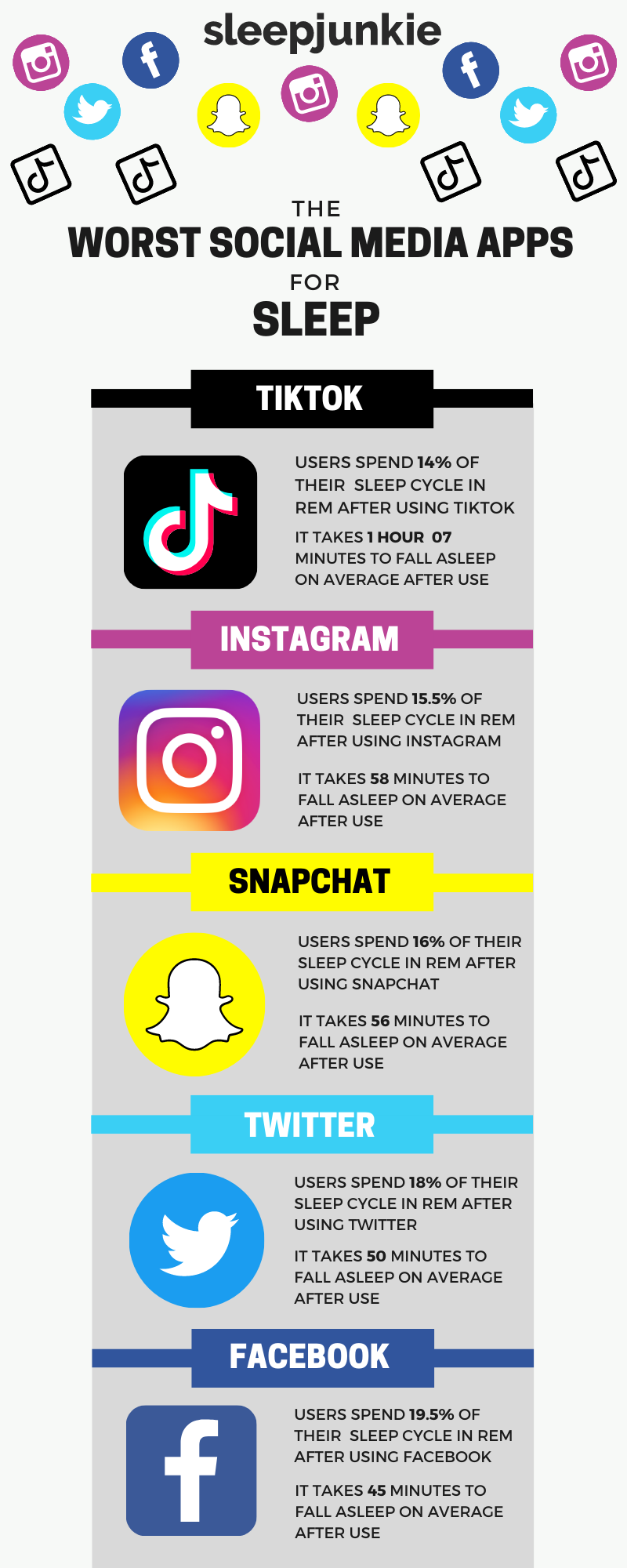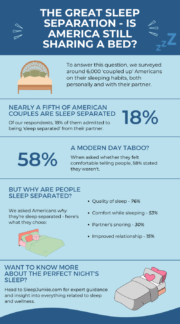Do you ‘revenge sleep procrastinate’? Well, it could be bad for your health!
- Social media usage before bed, particularly on platforms like TikTok, significantly impacts sleep quality, reducing the time spent in the REM phase and increasing the time taken to fall asleep.
- Blue light emitted from electronic devices disrupts melatonin production, affecting sleep patterns and overall sleep quality. Limiting electronic use at least 30 minutes before bedtime can significantly improve sleep hygiene.
- Several habits can negatively impact sleep quality, including nighttime vigorous exercise, late-night eating, excessive caffeine consumption in the evening, inconsistent sleep schedules, uncomfortable bedroom conditions, prolonged time spent in bed without falling asleep, and excessive stress.
Many of us are struggling with our sleep now more than ever, and the growing presence of social media in our lives isn’t helping us receive the quality of sleep we need or deserve.
We surveyed 2,012 Americans and found that over three quarters (78%) admit to doing a form of ‘revenge sleep procrastination’, using their phones right up until falling asleep, which has a major impact on quality of sleep.
According to our sleep expert Dorothy Chambers, ‘revenge sleep procrastination’ is when we delay going to sleep to do other unimportant things that we haven’t had time to do in the day, and reflects a very poor work/life balance.
We selected some of the world’s most popular social media apps, to test which had the worst impact on sleep quality, and help determine which apps we should steer clear of in the run up to bedtime.
We asked each participant to wear a smartwatch to record how long it took to fall asleep and the amount of time spent in the REM phase of the sleep cycle, as well as provide feedback on how tired they felt the next morning after using their designated app, in the hour before falling asleep.
We can reveal from this study that the app impacting sleep quality the most is TikTok, with users of the popular video app only spending 14% of their sleep cycle in the vital REM phase, almost half of the amount of REM sleep they should be receiving.

Average percentage of sleep spent in the REM phase & average time taken to fall asleep after using popular apps before bed:
- TikTok – 14% / 1 hour 07 minutes
- Instagram – 15.5% / 58 minutes
- Snapchat – 16% / 56 minutes
- Twitter – 18% / 50 minutes
- Facebook – 19.5% / 45 minutes
- Pinterest – 19.5% / 38 minutes
- YouTube – 19.5% / 32 minutes
- WhatsApp – 21% / 34 minutes
- Reddit – 21.5% / 35 minutes
- Tumblr – 21.5% / 39 minutes
- No electronic engagement – 23% / 25 minutes
So why are social media apps so bad for our sleep cycle?
We think it’s largely down to the blue light emitted from your phone screen, which increases your alertness and results in above average falling asleep times. However, we believe social media apps like TikTok are especially bad as they encourage the release of adrenaline and dopamine, giving us energy and a ‘happy’ feeling. This could be why many of us choose them as our means of ‘revenge sleep procrastination’, even though we know they don’t help us to unwind before bed.
Here at Sleep Junkie we recommend not using any electronics for at least two hours before sleeping because of the blue light emitted from the devices.
Blue light stimulates the brain and reduces natural melatonin production, increasing tiredness, and in turn decreasing the amount of time spent in the REM phase of sleep, which can lead to adverse implications on physical and mental health.
Here’s our guide on how to improve your sleep hygiene and kick bad sleep habits in 2024.
1. Using Electronics Before Bed
Many of us are attached to our electronics and enjoy using them at night to relax. But watching TV or browsing on your phone before bed isn’t doing your sleep any favors.
The blue light emitted from electronics blocks melatonin release and alters your circadian rhythm cycle, raising blood sugar levels and lowering leptin levels (the hormone affecting your appetite). We suggest putting your electronics away at least 30 minutes before bed to avoid sleep deprivation. Instead, try reading a book or taking deep breaths to wind down.
If you use your cell phone as your alarm, it’s tempting to scroll through it before going to bed since it’s sitting right there. Instead, consider using a traditional alarm clock and place your phone outside of your bedroom at night.
2. Vigorous Exercise At Nighttime
Working up a sweat before bed is quite counterproductive. Although the evenings might be the only time you can exercise, it’s too overstimulating to sleep afterward. Exercise releases endorphins and raises cortisol levels, leaving your body alert and wide awake.
Don’t completely cut exercise out of your life, as even 10 minutes of exercise a day can improve sleep quality. Schedule intense exercise at least 3 hours before bed so you have enough time to relax afterward, and if you can only exercise at night, stick to light stretching and walking. A little bit of exercise can improve sleep significantly.
3. Eating In Excess Before Bed
Eating late at night can cause indigestion and heartburn, leaving you uncomfortable and in pain. Acidic, spicy, sugary, and salty foods are likely to keep you awake, so avoid them before bed. Enjoy heavier meals earlier in the day so your body has time to digest and metabolize the food.
Still, going to bed hungry isn’t ideal. If you need a snack or food before bed, eat something high in protein and fiber, such as a piece of whole-grain toast with peanut butter.
4. Caffeine Consumption in the Evening
Caffeinated drinks such as coffee, black and green teas, soda, and energy drinks are notorious for inhibiting sleep. They’re stimulants meant to keep you awake, so don’t drink them late at night. Drinking coffee is helpful when you’re feeling groggy in the morning, but remember—caffeine doesn’t eliminate fatigue—it only temporarily relieves it.
Plus, consuming caffeine can affect how you fall asleep if you do it too late in the day. Enjoy soda or coffee in the mornings or early in the day. During the evening, a glass of non-caffeinated tea or warm water is a good way to wind down.
5. Following Inconsistent Sleep Hours
Following a sporadic sleep schedule is tough on your body and may mess up your circadian rhythm. If you barely sleep during the workweek, only to sleep all weekend, your body clock falls out of line. Build a schedule to ensure you sleep around 7 to 9 hours per night. Try sleeping and waking up within the same 30 minutes every day, even on weekends.
Although it seems helpful at the moment, taking a long daytime nap only makes it harder to get to sleep at night. Keep naps brief (30 minutes or less), and schedule them at least 7 hours before bedtime. Stability in your sleep schedule improves your circadian rhythm and makes it easier to get quality rest.
6. Sleeping in Uncomfortable Bedroom Conditions
Sleeping in a noisy, bright, or hot bedroom is disruptive and makes falling asleep difficult. Ideally, your bedroom should be between 60 to 67 degrees Fahrenheit and, if needed, add blackout curtains to your bedroom, and wear earplugs. This way, your bedroom can be a quiet and dark oasis.
One of the foundations of quality sleep is investing in a high-quality mattress and pillows. Use a mattress and pillows fit for your body type and sleeping position to properly support your body and prevent aches and pains. Without any pain and discomfort, sleeping undisturbed might get easier.
7. Laying In Bed Too Long
Many people know the frustration of getting into bed only to sit there, unable to fall asleep for hours. If you’re struggling to sleep for more than 20 or so minutes, it’s better to get out of bed rather than staying put.
Now is not the time to turn on electronics. Instead, relax by sitting upright, breathing deeply, splashing water on your face, or reading a book next to a warm-toned lamp. Once you’re tired again, get in bed and try sleeping.
8. Overstressing
It’s difficult to relax at night when all you can think about is tomorrow’s stressful tasks, though canceling meetings or avoiding tests isn’t the answer. Try transferring any stress-filled thoughts into a journal to put your worries at ease until the morning. You might also tame your thoughts with a relaxing bedtime routine: wash your face, lightly stretch, take deep breaths, or take a warm bath.


